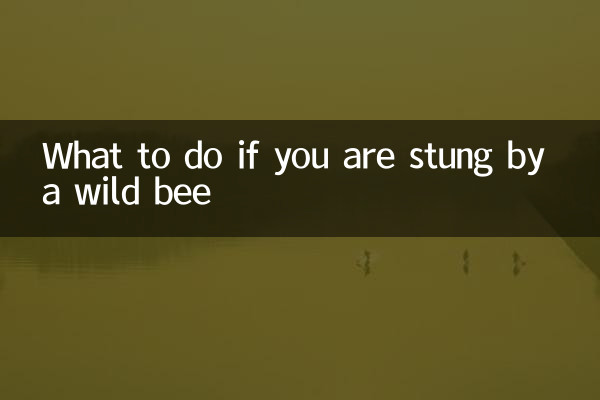What to do if you are stung by a wild bee
Recently, as the weather warms up, outdoor activities have increased, and frequent incidents of being stinged by wild bees have become one of the hot topics. This article will provide you with detailed treatment methods and precautions to help you respond quickly in emergencies.
1. Emergency treatment steps after being stung by wild bees

1.Quickly stay away from the beehive: After bees sting, they usually release pheromones to attract other bees to attack, so they need to stay away from the scene immediately.
2.Check the wound: Observe whether there are any stings left. The stings of bees usually have barbs that stay inside the skin.
3.Take out the poisonous sting: Use the edge of the credit card or blunt blade to gently scrape the sting to avoid squeezing the sac that causes more venom to be injected.
4.Clean the wound: Rinse thoroughly with soapy water and clean water to reduce the risk of infection.
5.Cold compress to relieve swelling: Apply an ice pack or a cold towel to the affected area for 10-15 minutes each time to relieve pain and swelling.
2. Common symptoms and response measures
| Symptom Types | Performance | Response measures |
|---|---|---|
| Local reaction | Redness, swelling, pain, itching | Cold compress, topical antihistamine ointment (such as hydrocortisone) |
| Moderate allergies | All-body rash, nausea, dizziness | Oral antihistamines (such as loratadine) and seek medical treatment in a timely manner |
| Severe allergies (allergic shock) | Difficulty in breathing, sudden drop in blood pressure, confusion in consciousness | Inject adrenaline immediately (if you have a first aid pen) and call the first aid number |
3. Tips to prevent bees from stinging
1.Avoid wearing bright clothes: Bees are sensitive to bright colors (such as red, yellow), and it is recommended to choose light or neutral clothing.
2.Stay away from flowers and beehives: Pay attention to the surrounding environment when outdoor activities to avoid getting close to bee-gathering areas.
3.Do not use perfume or hair glue: Strong odors may attract bees.
4.keep Calm: Do not wave your arms or run when encountering bees, just leave slowly.
4. Recent hot events
| time | Place | Event Overview |
|---|---|---|
| May 10, 2023 | Hangzhou, Zhejiang | A tourist was stung by a wild bee colony in the scenic area, causing allergic shock. He was rescued and escaped from danger. |
| May 15, 2023 | Chengdu, Sichuan | Giant hives were found in the park, and the fire department urgently demolished them to avoid injuries |
| May 18, 2023 | Shenzhen, Guangdong | Expert reminder: Bee activities frequently in summer, you need to master first aid knowledge |
5. Special precautions
1.Children and allergic constitutions need to be extra careful: Children have thin skin and may have stronger reactions; people with allergic constitution should carry first aid medication with them.
2.Don't suck out venom with your mouth: This method is ineffective and may cause secondary infection.
3.Be cautious in folk remedies: If applying toothpaste, onion, etc., it may aggravate the symptoms. It is recommended to give priority to scientific treatment methods.
4.Observation for 48 hours: Even if the initial symptoms are mild, allergic reactions may be delayed and should be closely observed.
6. Medical Guide
Please seek medical treatment immediately if the following situations occur:
- The sting area is in the mouth, throat or eyes
- More than 10 stungs in a single time
- Systemic symptoms such as dyspnea and chest tightness
- Signs of infection such as suppuration and fever in the wound
Through the detailed review of the above content, I hope it can help everyone to calmly deal with bees and reduce damage when they encounter stings. When outdoor activities in summer, safety is the first priority and prevention is the main priority!

check the details

check the details